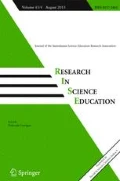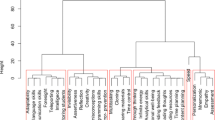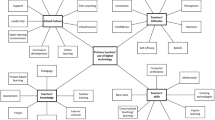Abstract
In this paper we continue our search for a socially responsible science education by an examination of the trends in the Science, Technology and Society movement. These trends reflect differing ideological perspectives and result in courses which serve different ends. We identify two major flaws in the movement that inhibits the realization of a schooling in science dedicated to democracy. We propose skills necessary for citizens to participate in debate over issues surrounding the impact of science and technology on society and a teaching stategy to help develop them.
Similar content being viewed by others
Reference Notes
Brunning, M. & Hely, D. (1988).Future Science Today. Melbourne: Longman Cheshire.
CEPUP. (1991).Investigating groundwater: The Fruitvale story. Menlo Park: Addison-Wesley.
DEET. (1991).A National Statement on Science for Australian Schools, Draft of First Stage of Document. Department of Employment, Education and Training, Commonwealth Government, Australia.
DES (Department of Education and Science and the Welsh Office). (1989).Science in the National Curriculum London, Her Majesty's Stationery Office.
McAllister, R. (1985).Studies in Science and Technology for Years 11 and 12: A discussion paper. Department of Education, Queensland.
Perrin, B. (1989).Science, technology and society. Milton: The Jacaranda Press.
PLON. (1984, translated 1988).Ionizing Radiation. Utrecht: Centre for Science and Mathematics Education, University of Utrecht. Translated by Monash University.
SATIS. (1986).Science and technology in society 2. The Association for Science Education.
Snape, G. (1990).Structures and machines. Harlow: Longman
Solomon, J. (1983).Science in a social context. (titles include, Technology, Invention and Industry), Basil Blackwell and The Association for Science Education.
The Salters' Chemistry Course, (1987).Transporting chemicals. York: University of York.
UNESCO. (1988).Educational materials linking technology with science education. Technology in Life, Paris, UNESCO.
VCAB (Victorian Curriculum & Assessment Board). (1990).Environmental studies: study design. Melbourne, VCAB.
References
Aikenhead, G.S. (1990). Consequences to learning science through STS'. Paper presented to the British Council's ‘Science, Technology & Society Education’ course, Department of education Studies, Oxford University, September 10–20.
American Association for the Advancement of Science. (1989).Science for all Americans. Washington DC, American Association for the Advancement of Science.
Bernal, J.D. (1949).The freedom of necessity. London: Routledge and Kegan Paul.
Blank, R.H., Caldwell, L.K., Wiegele, T.C. & Zilinskas, R.A. (1988). Toward better education in biopolitics,Issues in Science and Technology, 4, 3, 51–53.
Chapman, B. (1991). The overselling of science education in the eighties,School Science Review, 72, 260, 47–63.
Cross, R.T. & Price, R.F. (1988). J.D. Bernal and Science Education: A tribute to the 50th anniversary of the publication of the “Social Function of Science”,Research in Science Education, 18, 152–159.
Dalton, L. (1991).Radiation exposures, Newham: Scribe Publications,
Gaskell, P.J. (1982). Science education for citizens: Perspectives and issues. I. Science, Technology and Society: Issues for science teachers,Studies in Science Education, 9, 33–46.
Hargreaves, J. & Hargreaves, T. (1983). Some models of school science in British curriculum projects, and their implications for STS teaching at the secondary level,Social Studies of Science, 13, 569–604.
Lewis, J.L. (ed), (1987).Science and technology education and future human needs, (9 vols), Oxford: Pergamon.
McFadden, C.P. (ed.), (1980).World trends in science education. Halifax: Atlantic Institute of Education.
Nelkin, D. (1982). Science education for citizens: Perspectives and issues. II. Science and technology policy and democratic process,Studies in Science Education.9, 47–64.
Schwab, J.J. (ed.) (1963).Biology teachers' handbook (Biological Sciences Curriculum Study), New York, John Wiley & Sons Inc.
Solomon, J. (1988). ‘Science technology & society courses: tools for thinking about social issues’,International Journal of Science Education, 10, 4, 379–87.
Spiegel-Rösing, I. & De Solla Price, D. (eds.) (1977).Science, technology and society: A cross-disciplinary perspective. London: Sage.
UNESCO. (1988).Educational materials linking technology teaching with science education: Technology in life. Paris: UNESCO.
Von Winterfeldt, D. (1986).Value free analysis: An introduction and an application to offshore oil drilling. In P.R. Kleindorfer & H.C. Kunreuther (Eds.),Insuring and managing hazardous risks: From Seveso to Bhopal and beyond. Berlin: Springer-Verlag.
Winner, L. (1978).Autonomous technology. Cambridge, MA: The MIT Press.
Ziman, J. (1980).Teaching and learning about science and society. Cambridge, UK: Cambridge University Press.
Author information
Authors and Affiliations
Additional information
Specializations: social responsibility and the curriculum, ideology and comparative science education.
Rights and permissions
About this article
Cite this article
Cross, R.T., Price, R.F. Towards teaching science for social responsibility: An examination of flaws in science, technology and society. Research in Science Education 21, 47–54 (1991). https://doi.org/10.1007/BF02360456
Issue Date:
DOI: https://doi.org/10.1007/BF02360456




